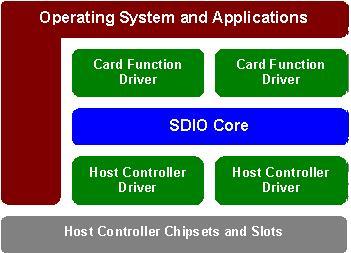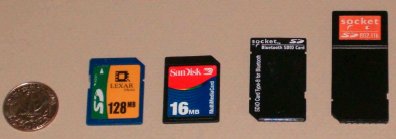SDIO stack does DMA, supports Linux
Nov 8, 2005 — by LinuxDevices Staff — from the LinuxDevices Archive — 18 views[Updated 12PM] — Codetelligence has revised its platform-independent SDIO (secure digital I/O) stacks and tools, adding support for DMA (direct memory access) and other performance-oriented features. Embedded SDIO 2.0 supports Linux 2.4 and 2.6, and includes a host developer's kit (HDK), peripheral developers kit (PDK), and a licensable SDIO stack.
Codetelligence was among the first vendors to launch an SDIO stack for Linux, in January of 2005. Since then, Linux stacks have appeared from EmbWise, of Chennai, India, and BSquare. Codetelligence says that its products are more portable than competing SDIO stacks.
Codetelligence's SDIO line includes a PDK targeting companies writing drivers for SDIO cards — small peripherals based on the MMC/SD card form factor.
Size comparison of SD/MMC memory cards and SDIO bluetooth and 802.11 cards
Codetelligence also offers an HDK targeting developers writing drivers for SDIO host controllers. The HDK is a superset of the PDK, and can also be used to develop peripheral drivers, according to President Paul Lever. Additionally, Lever says that peripheral drivers built using Codetelligence's PDK will work with any properly implemented host drivers built using its HDK.
Codetelligence also offers a portable SDIO core stack.

Codelligence Embedded SDIO stack architecture
Interestingly, open source drivers available in the Linux community for some SDIO peripherals and controllers may not be legal, unless they were implemented based on a licensed copy of the SD Card standard, available from the SD Card Association for $1,000. “They're definitely not [legal],” Lever said.
Embedded SDIO, version 2.0
Codetelligence says version 2.0 of its SDIO stack includes support for the newest specifications from the SD Card Association, including “advanced DMA” capabilities in the SD Card Association's “Standard Host Controller 2.0” definition, which the company plans to track, according to Lever.
Other claimed new features in version 2.0 include:
- Support for high-speed SD modes (SD Physical 1.10).h
- Support for MMC 4.1 (MMCPlus) high-speed modes and wide bus (4 and 8 bit) support
- “Top-to-bottom” DMA support (card drivers to host drivers to hardware) - includes simple and advanced scatter-gather hardware
- Short transaction performance options to increase throughput on short data transfers
- Additional sample Host Controller Drivers, including Intel PXA27x (also supported by EmbWise's stack) and TI OMAP
- Additional embedded operating system support including GreenHills Integrity
- Socket Communications SDIO WiFi driver available
- SPI Library takes the parsing work out of raw SPI interfaces
Lever said, “Whether you are prototyping software, proving a silicon design, or integrating the stack on a new embedded platform, the performance of the Embedded SDIO Stack will let you optimally show-off your SD/SDIO hardware. The addition of standard driver support of the latest Socket WiFi SDIO cards continues our expansion of the SDIO toolkits.”
He adds, “Linux is our number one product.”
Socket VP of Engineering Bob Miller said, “Codetelligence's software expertise in various RTOS environments coupled with Socket's products makes an excellent combination for a total system-level solution.”
Availability
Version 2.0 of Codetelligence Embedded SDIO products are shipping now. The PDK is priced at $3K per seat. The SDIO core stack is available with per-unit licensing. Further details are available from Codetelligence.
This article was originally published on LinuxDevices.com and has been donated to the open source community by QuinStreet Inc. Please visit LinuxToday.com for up-to-date news and articles about Linux and open source.
